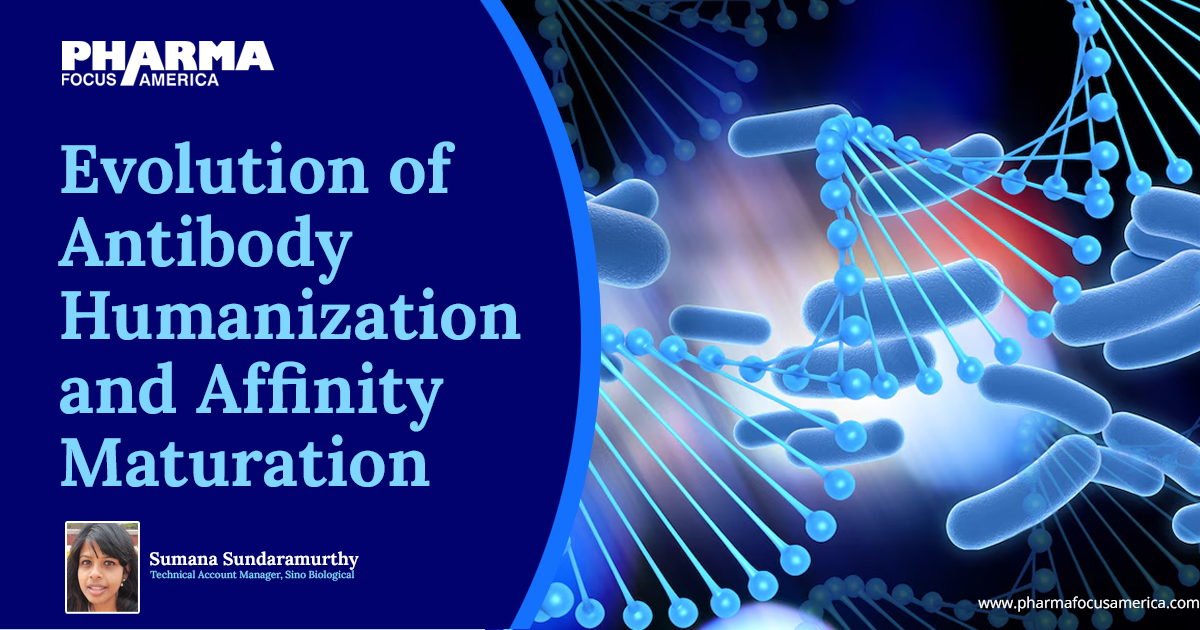Evolution of Antibody Humanization and Affinity Maturation

Strong 8k brings an ultra-HD IPTV experience to your living room and your pocket.
Antibodies play a vital role in the immune system by providing protection against foreign invaders, such as bacteria and viruses. Produced by B cells, antibodies are protein molecules that can be harnessed to treat cancers, autoimmune disorders, and various infectious diseases. However, the human immune system may recognize modified therapeutic antibodies as foreign substances, reducing their efficacy. To overcome this challenge, the following two processes have been developed: antibody humanization and affinity maturation.
Antibody humanization and affinity maturation have revolutionized the biotech industry in the past 10–20 years, enabling the development of highly effective therapeutic antibodies that can be used to treat a wide range of diseases. Prior to antibody humanization and affinity maturation, therapeutic antibody development was a slow and challenging process, often reliant upon less effective nonhuman sources that led to the elicitation of unwanted immune responses and low binding affinities. Antibody humanization and affinity maturation have changed this paradigm by enabling the development of therapeutic antibodies that are more effective at treating diseases. By enhancing binding to the target molecule, increasing half-lives in the body, and improving immune cell recruitment, these processes have improved therapeutic antibody effectiveness while avoiding elicitation of an immune response in humans. Therefore, the advancement of antibody humanization and affinity maturation technology holds immense potential in facilitating the development and enhancing the quality of therapeutic antibodies.
Antibody Humanization
Antibody humanization is a crucial process in the development of therapeutic antibodies, which involves modifying nonhuman antibody molecules to make them more compatible with the human immune system. Although nonhuman antibodies, such as those of mice and rabbits, are commonly used in research to develop therapeutic antibodies, they can elicit an immune response when used as therapeutic agents in humans, reducing their efficacy.
To achieve humanization, the amino acid sequence of a nonhuman antibody molecule is modified to match that of a human antibody molecule. X-ray crystallography and nuclear magnetic resonance spectroscopy are used to identify the antigen-binding site, and then bioinformatics and computational modeling allow the prediction of the structural consequences of framework and complementarity-determining region (CDR) modifications. This process enables the creation of a molecule that can be used as an effective therapeutic agent in humans without causing an immune response. Overall, antibody humanization is critical in developing therapeutic antibodies, as it enables them to be used in humans with reduced immunogenicity, improving their efficacy in treating diseases (Fig. 1).
Sino Biological offers an antibody humanization service through its CDR grafting technology, providing a success rate of 100% and >95% sequence homology compared to human antibody frameworks. Our humanized antibody packages guarantee equal or higher affinity than any parental or chimeric antibody (Fig. 2).
Affinity Maturation
Affinity maturation is another integral process in the development of highly effective therapeutic antibodies. It involves creating mutations in the CDRs of an antibody, which results in structural changes that can facilitate optimal interactions with the antigen, thereby increasing its binding affinity, i.e., the strength of the interaction between the antibody and its target. The higher the affinity, the more effective the antibody is at binding to its target and eliciting a response. Traditionally, affinity maturation has involved multiple rounds of testing and modification to identify an amino acid sequence that will maximize the antibody’s affinity to the target.
Application of Artificial Intelligence
The use of artificial intelligence (AI) has revolutionized antibody humanization and affinity maturation in the biotech industry. By analyzing large datasets of antibody molecules, AI can identify specific amino acid sequences that are most likely to increase the binding affinity of the antibody to its target and be compatible with the human immune system. This has greatly reduced the time and cost involved in developing therapeutic antibodies, making the process more accessible to researchers and biotech companies. Consequently, there has been an increase in the number of therapeutic antibodies in development and a decrease in the time it takes for these antibodies to reach the market.
Read more: https://www.pharmafocusamerica.com/advertorials/evolution-antibody-humanization
Note: IndiBlogHub features both user-submitted and editorial content. We do not verify third-party contributions. Read our Disclaimer and Privacy Policyfor details.


